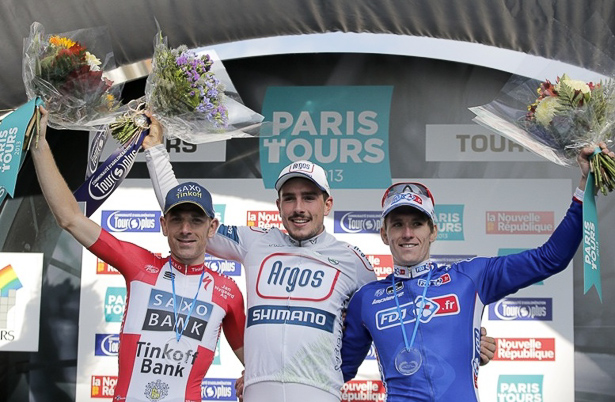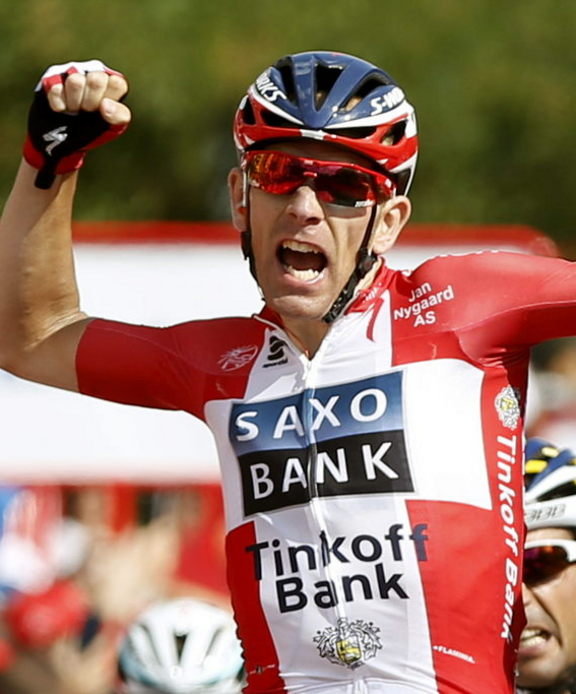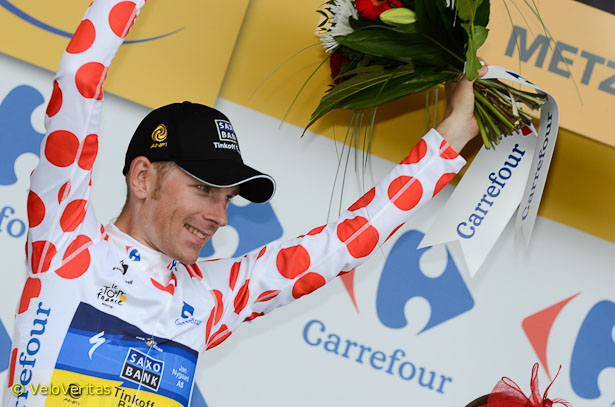The last time we spoke to Denmark and Saxo Bank’s Michael Mørkøv – after he’d won a dramatic Vuelta stage – we said that perhaps it was time to stop referring to him as a ‘Six Day star.’
We were right.
As well as being able to win a hotly contested Danish Elite Road Race Championship in a mass charge to the line and get round Fabian Cancellara in a straight drag race for a Grand Tour stage he’s now able to claim a podium place in one of the world’s oldest and most famous Classics, Paris-Tours.
The UCI may have decided that it’s not as important a race as the Tour of Beijing – but somehow I don’t think we’ll still be talking about the Chinese race some 107 years after it was first run, as we do with Paris-Tours.
And it’s unlikely that names like Van Looy, Moser, Maertens and Kelly will ever grace the role of honour.
Germany and Argos’s ‘fastest of the fast men when it’s just that wee bit tougher’ John Degenkolb was quickest in beautiful Tours this autumn and right behind him was our Mr. Mørkøv.

But he was in front of the likes of fast rising French flyer Arnaud Demare (FDJ) and Washington fast man who’s finding his touch again, Tyler Farrar (Garmin) – by no means easy men to out-drag.
The Dane had displayed good form coming in to the event with a strong performance in the late season stage race, Tour de l’Eurometropole – formerly the Franco Belge – and we started by asking him about his good form there.
“I came out of the Vuelta in really good shape and the Franco Belge was a race I was focused upon along with the Vandenbroucke Memorial and Paris-Bourges.
“I had big expectations for all of those races and in Franco Belge I was going very well.
“It’s good to be up there in a Classic – I was very happy to deliver that performance, it demonstrates what I’m capable of.
“The Vuelta was a very hard race; from the middle of it onwards I had a hard time – but so did everyone else.
“I actually had high expectations for the final stage of the Vuelta but it didn’t work out as I’d planned.”
Paris-Tours must be a race which requires a lot of concentration – being so flat and with all those endless straights?
“It’s like Milan-Sanremo in that you have to survive the early part and take care – but save your main focus for the final, that’s when you need all of your concentration.”
Even before the sprint you were very active.
“We were away on the second last climb – I was surprised how easily that happened, Karsten Kroon was taking care of me and all of a sudden we were clear.
“I got a bit of a rush, like; ‘wow! we’re clear in the final of Paris-Tours!’
“I kept the speed up on the climb because I was worried that Chavanel or Van Marcke might try to get clear on their own.”
Demare and Farrar are quick guys…
“I’m pretty quick most times – but a lot of it is about positioning in a bunch finish.
“My team mate Jonas Jorgensen helped get me in to a good position; I lost a place or two on the last corner – but I managed to get Degenkolb’s wheel, which was the best place to be.”
Degenkolb was complaining that Belkin were blocking too aggressively for their man Bol who was clear solo in the finale?
“He’s right – and I was also hindered by a Belgian guy who pushed in between Jonas and I on the run in.
“There’s no doubt that for Belkin it was frustrating watching their team mate getting chased down – but you have to remember sportsmanship.
“You can’t change it if your man is going to get caught by the peloton and you shouldn’t be doing things like passing on the inside on corners to slow the chasers down – it’s not correct.”
It seems you finish best when it’s a bit of a free for all with no ‘trains?’
“Yes, that type of finish suits me best; with my track background I know how to handle a sprint and which wheels to take.
“But when you have the trains and maybe 20 sprinters in the mix it’s very hard to get the right position – I don’t consider myself a pure sprinter.”
Any ‘what ifs?’
“You can never be totally happy with second place but I’ve no regrets about that final; I was right there with the best guys in a good position and Degenkolb is fast – so no regrets.”
Has the Danish champion’s jersey boosted you?
“I think so, when I won it back in June my team mate, Matti Breschel said to me that it would boost my confidence and give me results.
“That was how he felt when he was champion in 2009.
“And it showed my team mates what I could do and that I was worthy of their support and confidence.”

Does the jersey and a Grand Tour stage win get you more respect in the peloton?
“Of course – everyone respects the guys who win.
“You don’t get as much respect as the very top guys – they have a lot more freedom to move around the peloton – but you get a lot of respect from the guys you know and who’ve seen you progress.”
Is that your season over?
“Yes, Paris-Tours was my last race, so it’s a good way to end the season.
“I’m back in Denmark enjoying a vacation before our training camp in November.
“I have at least one Six Say – my home race in Copenhagen in February and maybe Rotterdam in January.”
Two Euskaltels in the top 10 at Paris-Tours; it says a lot about how desperate riders are to get a contract.
“The races in the last two weeks have been very aggressive, right from the gun there have been a lot of attacks.
“In the past those races have been more controlled – but this year there are a lot of guys wanting to show themselves.
“I’m happy that I still have two more years of my contract to run.”
We’ve been hearing a lot about Saxo in the press…
“I don’t know much more than what you’ve read in the press but it’s good that Saxo Bank have upped their support.
“It’s a Danish company supporting a Danish team and that makes me proud to have their name on my jersey.”
2014; too early to talk about?
“No, not too early – I’ve finished this season on a high and that gives me a lot of confidence for the Spring Classics.
“I know all those races and think that I’m at a higher level now to go back to them.
“And I’d like to make the Saxo Bank team for the Tour de France . . .”

As our friend Ivan said; ‘Michael is getting seriously good!’ We wish him all the best for 2014.



